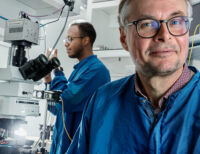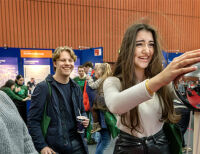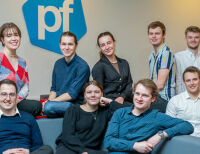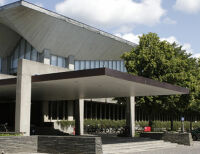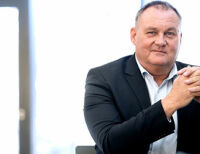Thursday 24 Jun 21
DTU will soon be the only university in Denmark to give all MSc students the tools to have great ideas. This will happen when a new course, developed with help from the students themselves, goes live. Philip Binning, Dean of Graduate Studies, calls the course ‘groundbreaking’.
Six students at DTU’s Skylab innovation laboratory have put their thinking caps on. They want to solve a problem that they believe is key for Danish consumers—namely, that it is too difficult to discern whether a product is sustainable or not. Their thoughts are stuck up on the yellow walls of Skybox using blue and pink Post-its. And at the centre of it all is today’s key question, which has already created a lively debate:
How do we worsen the product’s transparency in relation to sustainability?
It seems chaotic, but there’s a purpose. The question has sparked a negative brainstorming session, one of the methods presented in a new course in innovation, which the students are in the process of testing.
Over the last four months the six students has been tasked with providing ongoing feedback while the course has been in development. Now they are trying it out for the first time in practice, and the process have led to a great deal of excitement.
“Normally, the University’s decisions are made at a higher level. We have been included here, and I think that is really positive,” says Andrei Cosmin, who holds a BSc in General Engineering.
Together with his course mate, Ida Olson, he is racking his brain for ideas. Ida Olson puts a hand up between them to signal a timeout. Then she grabs a block of Post-its and starts writing.
The target group has the power
The brainstorming session in Skylab is the culmination of an intense development process, spearheaded by Jaap Daalhuizen.
He is normally working as an associate professor at DTU Management, but for the past year, as course coordinator, he has facilitated an unconventional collaboration between faculty staff and students across DTU. The result is a thoroughly planned innovation process, which is now being tested.
For Jaap Daalhuizen, the ambition has been to create a course with students’ needs in mind, and to achieve this he has seen it as a matter of course to involve them:
“We knew that we would have to involve our target audience from the beginning to understand what they need, what their problems might be, and the concerns they may have. Through this we had the idea that the course should have teams with different roles, but how to actually structure the course really got going once the students came on board,” explains Jaap Daalhuizen.
The idea of involving the target group is also reflected in the course content itself: In short, a team should define a societal problem and then develop a solution for it. In this process, the team has to go and seek out its target audience several times, to ask what they need and whether the solution would be effective. According to Jaap Daalhuizen, it is an important way to learn more about your product, and to ensure that you do not waste time.
“When you innovate, sometimes you will fail. There is always a risk that your target audience will not need your product. But if you don’t go out and talk to them, you can spend months developing a product that you won’t find out isn’t needed until it hits the market. And that’s a bigger problem than realizing that you didn’t hit the mark the first time.”
Jaap Daalhuizen points out that many engineers are not used to seeking out the people they are developing solutions for, and this is often reflected in the end product. That’s why with the new course, Jaap Daalhuizen will incorporate thinking about the target group throughout the entire innovation process into the mindset of a DTU student.
‘Everyone can learn to have good ideas’
Andy Filipovic is a living example of Jaap Daalhuizen practising what he preaches. Since February, Andy Filipovic, a newly qualified engineer in the field of Design and Innovation, has been employed by Jaap as team coordinator for the group of four students who have developed the course.
Andy Filipovic (to the left) and Jaap Daalhuizen (to the right) have drawn on each others experiences. As newly graduated Andy Filipovic has contributed with important knowledge from his time as a DTU-student.
It has been especially important to them that the competences and experiences that each student brings to the table are taken into account when forming the teams.
“In the formation of the teams, we have made it clear to everyone that there are different roles and different personality types, and that everyone has value and knowledge to offer,” explains Andy Filipovic.
In concrete terms, this means students who already have experience of innovating will have the role of facilitator. The facilitator must guide the team through the innovation process, and ensure that everyone is heard. Meanwhile the students without any experience will slowly realise how much they can contribute with both professionally and personally, Andy Filipovic believes.
The hope is that the inclusive approach will help dispel the misconception that Andy Filipovic experiences many students have about innovation.
“Many believe that there is a magical process and that you have to be a special type of person to be successful. But in fact, everyone can learn to have good ideas. There are specific tools and scientific methods that you can use to work through the innovation process and end up with a successful end product,” he explains. He stresses, however, that the result in itself is not the goal.
Therefore, students’ efforts are evaluated as passed/not passed, based on the learning process that they go through. So it doesn’t matter if they deliver a finished end product or koncept, but whether they manage to think creative, take chances and develop during the process. Those are the qualities an innovative mindset assists of, and its qualities, which the students can use in their future careers as researchers or product developers.
A win-win solution in 45 minutes
Back at DTU Skybox, the negative brainstorm between Andrei Cosmin and Ida Olson has led to a bright idea. On a pink Post-it Ida is holding, it says ‘Auto destruct products’. It is an answer to the question ‘How do we worsen a product's transparency in relation to sustainability?’
Ida Olson explains how the question and answer together have helped them move forward in the right direction:
“The question forced us not to think in terms of restrictions, and it made me write that we should only make products that can be used once and then be thrown out. It immediately made us think of Apple as an example, as their products only work for a limited period. We asked ourselves, ‘Can we make a system where the consumer will continue to buy a new product after a certain period of time, but where the old product can be recycled?’ It would be a win-win for both Apple and the consumer, as Apple would not suffer a financial loss, while the consumer would be able to buy new products with a clear conscience.”
Andrei Cosmin nods and adds:
“It took us no more than 45 minutes to come up with this idea.”
The idea is just one example of the many proposals that these days are born under the testing in Skylab.

A team is in a phase of the innovation process where every opportunity is open. Later they have to narrow the field and make a prototype of their concept.
The ideas start as Post-its on a wall, they are later turned into figurative prototypes, and then they eventually end up in the hands of the target groups, who provide valuable input for adjustments and improvements.
Philip Binning, Senior Vice President, Dean of Graduate Studies and International Affairs at DTU, has followed the development process during the testing of the course, and his enthusiasm for the students’ wealth of ideas is difficult to hide.
“It is just so uplifting. And it’s great to see an idea come to life. No other Danish university has innovation as a mandatory tenet for all graduates. It is groundbreaking – also at a global level. We have something pretty unique here,” he says.
The course shall provide top-class engineers
Marianne Thellersen, Senior Vice President, Director for Innovation and Entrepreneurship
"This helps DTU offer Europe’s best engineering study programme. The students learn to bring their knowledge to market and into play in society, to create a better world."
Together with Marianne Thellersen, Senior Vice President, Director for Innovation and Entrepreneurship, Philip Binning enjoys seeing the idea come true. Back in 2019 the two of them had a dinner at restaurant Radio on Frederiksberg when Marianne Thellersen got a thought: What about making an innovation course which could give the students a common language for innovation?
Later the thought was taken for a walk with Marianne Thellersen and Philip Binning and step by step it took shape. Marianne Thellersen believe that the course has great potential.“This helps DTU offer Europe’s best engineering study programme. The students learn to bring their knowledge to market and into play in society, to create a better world. When they go out to the workplace, they will be ready with the tools for sparking innovation, and they will be able to talk about it in a way that gets others involved,” explains Marianne Thellersen.
There are signs that the students agree. The feedback from the fourteen students who tested the course in June shows that they find it both useful and instructive. And then a clear picture emerges that it has moved a certain notion.
“Before, many students saw innovation as something that only a few brilliant and creative people can do. Now, they understand that innovation is a process and that can structure and apply in any field and that they can use in their own work at DTU and in their future career,” says Jaap Daalhuizen, and hereby he summarizes what the feedback shows.
Regarding the team with Andrei Cosmin and Ida Olson they are now planning to go on with their concept.
Later the thought was taken for a walk with Marianne Thellersen and Philip Binning and step by step it took shape. Marianne Thellersen believe that the course has great potential.“This helps DTU offer Europe’s best engineering study programme. The students learn to bring their knowledge to market and into play in society, to create a better world. When they go out to the workplace, they will be ready with the tools for sparking innovation, and they will be able to talk about it in a way that gets others involved,” explains Marianne Thellersen.There are signs that the students agree. The feedback from the fourteen students who tested the course in June shows that they find it both useful and instructive. And then a clear picture emerges that it has moved a certain notion.“Before, many students saw innovation as something that only a few brilliant and creative people can do. Now, they understand that innovation is a process and that can structure and apply in any field and that they can use in their own work at DTU and in their future career,” says Jaap Daalhuizen, and hereby he summarizes what the feedback shows.Regarding the team with Andrei Cosmin and Ida Olson they are now planning to go on with their concept.












